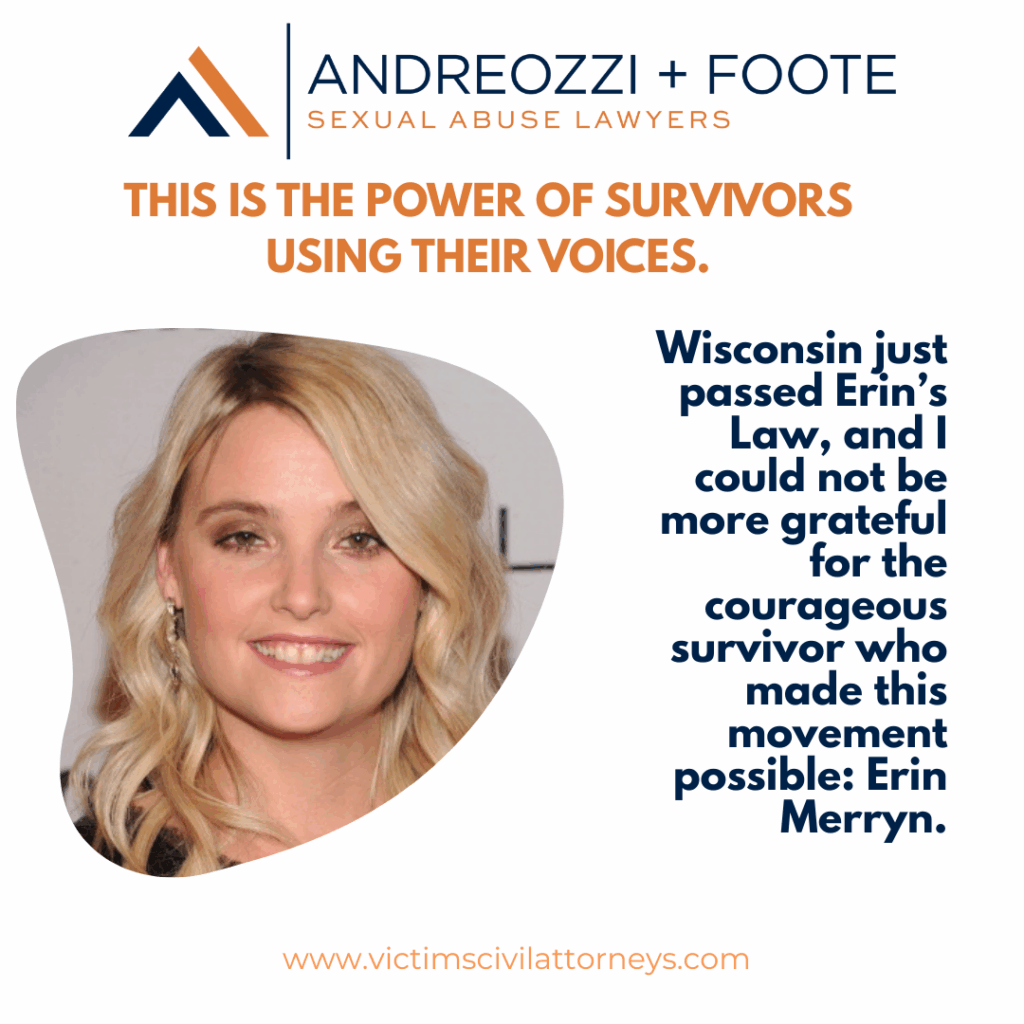A Survivor’s Journey to Legislation
Erin Merryn is not just a name on a bill she is a living testament to transformation and advocacy. As a childhood sexual-abuse survivor, Erin turned her pain into purposeful action.
She founded the initiative known as Erin’s Law, which mandates that schools teach students age-appropriate sexual abuse prevention education. Over 38 states had already adopted the law’s model by the time Wisconsin took the step. Her background as a social-work scholar and a writer (memoirs, children’s books) enhances her credibility: she knows intimately the impact of abuse and the importance of prevention.
Meeting Erin in person, I experienced what many survivors say: that voice, reclaimed, has power. Her presence is steady, her message clear: children deserve protection, and survivors deserve to be heard.
Wisconsin Passes Erin’s Law A Major Milestone
In November 2025 the Assembly Bill 156, officially “Erin’s Law,” passed the Wisconsin Assembly. It will now move to the State Senate and then to the Governor’s desk.
This legislation requires Wisconsin public schools to provide instructional programs to help children recognize, resist, and report sexual abuse. The curriculum spans from early grades through high school.
One legislator’s statement captures the urgency:
“The sexual abuse of a child is, unfortunately, more common than people think … This is why passing Erin’s Law and getting it signed into law is necessary, so we can better equip children with the knowledge and foresight in identifying wrongdoing.”
This law acknowledges what Erin has long taught: prevention education is not optional it’s essential.
The Power of Survivors Using Their Voices
Why does Erin’s story matter so much? Because when a survivor steps up, the impact is multilevel:
- Personal healing: For many survivors, reclaiming their voice is a powerful step in healing. Erin has transformed her trauma into activism, showing how vulnerability can become strength.
- Cultural transformation: Survivors like Erin change the narrative from shame and silence to transparency and protection. That means safer environments for children, fewer secrets, and more accountability.
- Legislative force: Survivor-voices bring undeniable moral clarity to policy. Erin’s advocacy has carried “Erin’s Law” across dozens of states and now into Wisconsin because it connects lived experience to public policy.
- Educational empowerment: When children learn about boundaries, recognizing abuse, and speaking out, we begin to shift what prevention looks like. Erin’s Law is about building safety skills early so harm doesn’t become hidden.
In short, Erin’s voice matters because it bridges what was done to her with what can be done for our children.
Why This Matters Now
- Too many children still suffer in silence. Erin’s Law addresses that by ensuring children receive age-appropriate education about their bodies, safety, and rights.
- Schools must pivot from reactive to preventive. Legislation like this empowers schools not just to respond after abuse but to prevent it from happening in the first place.
- Survivor advocacy isn’t sentimental; it’s essential. Policies built on real survivor experience are stronger, more responsive, and more human.
- Healing through action. When survivors engage publicly in advocacy, they not only help others—they continue to heal themselves. And they model resilience.
What Advocates and Allies Can Do
- Raise awareness. Share Erin’s story and the Wisconsin legislative win. Use hashtags like #ErinsLaw #ProtectOurKids #SurvivorAdvocate.
- Support implementation. Legislation is one thing; meaningful execution is another. Ask schools, districts, and state agencies how they will roll out the curriculum and ensure it’s effective.
- Empower survivor-leaders. Whenever possible, uplift the voices of survivors in prevention work. They have perspective, credibility, and lived clarity.
- Teach and talk. Whether you’re a parent, educator, or mentor, you can begin age-appropriate conversations about boundaries, consent, trust, and body safety.
- Stay vigilant. Laws can be passed—but they also need monitoring. Implementation, funding, teacher training, and accountability are all part of the journey.
Thank you, Erin.
Erin Merryn once said, “A child’s best defense is her voice.” That has never been truer than now. With Wisconsin’s passage of Erin’s Law, we are one step closer to a world where children are informed, empowered, and protected and survivors are acknowledged, respected, and amplified.
To Erin, thank you. Your story, your advocacy, and your resilience matter. Because of you, children in Wisconsin will have one more layer of protection, and survivors will see a path forward where their experiences build change.
And to every person reading this blog: Let’s keep telling the truth. Let’s keep fighting for legislation and education that reflect the dignity of every child. Because safe children mean a stronger, more just future one Erin has helped build.


